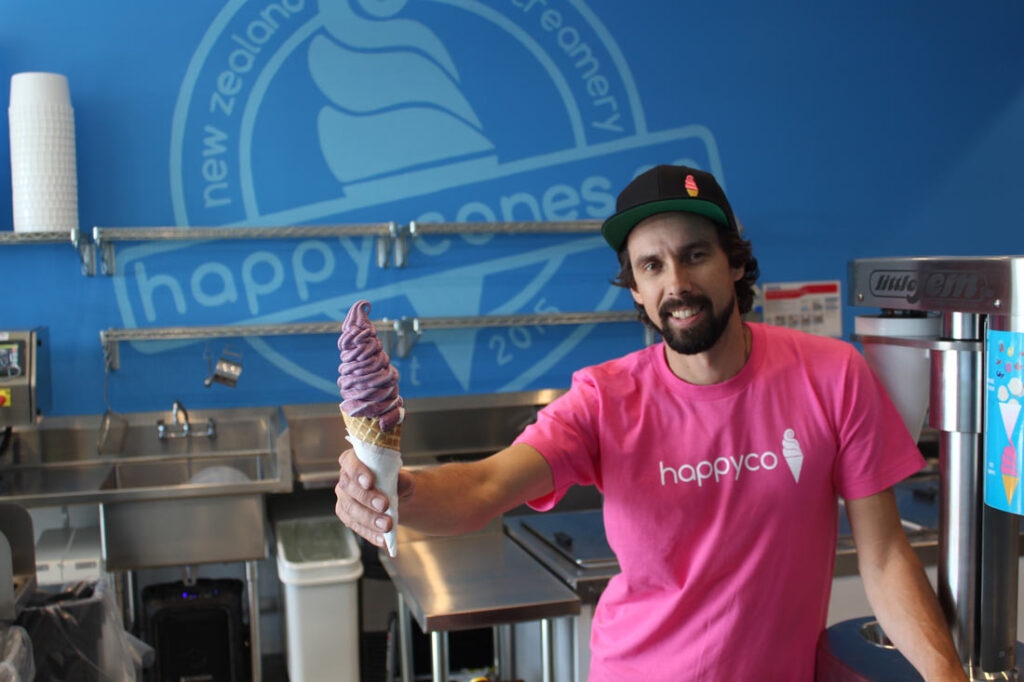When Hap Cameron turned 30 on 11/11/11, he had just summited Mount Kilimanjaro and was watching the sun rise from Uhuru Peak, Africa’s highest point—a poignant feat that was the symbolic cherry on top of a layered life goal of working and living on every continent by the time he was 30.
Since Africa was the final continent on his list, the photo captured a scenic closure. The view looked amazing, as did his life for that past decade—dressed in a tuxedo and white gloves while working on a six-star cruise ship in Antarctica; suntanned and smiling after a day of surfing in Puerto Escondido, Mexico; and looking giddy in love on a beach in Colombia with his now-wife, Mandy, whom he met halfway through his travels.
But lots of those smiles were masking endless confusion and a complete lack of direction.
“In truth, I was completely lost and not even happy about completing that final goal,” Cameron admits.
Losing his guiding light
When he returned to his hometown of Nelson, New Zealand, he was invited to take part in several TV and radio interviews—as well as being featured in several print pieces—to talk about his world travels, and he found himself having to hide the fact that he was depressed.
“All I had to my name was a pack of my clothes and my bike,” he remembers. “I was living with my parents in their spare room. I had no insurance and no plans. I was writing Hap Working the World, about my travels, and making a documentary, Bikes for Africa [about helping implement a self-sustainable bike workshop in rural Namibia], and all I had were memories. I was worried about the future. Getting out of bed was hard. The whole focus of my life for nine years was traveling the world. When I turned 30, I felt my guiding light was going out.”
Nothing at the time would point to the fact that the biggest adventure of his life would soon give way to another, even bigger one. There was no possible way to know that he would transform from an aimless wanderer to a successful entrepreneur, starting a tiny empire in Colorado that would ripple across the country—and the world—inspiring other entrepreneurs to follow suit. How could he have known he’d have a new life in America with the woman of his dreams and two beautiful daughters when all he knew in this moment was the thick, sticky caramel sauce drizzled atop deflated dreams?
Cameron’s feelings were understandable, after all. In Africa, he ended a love affair that spanned more than half his time abroad. Mandy, his then-girlfriend, knew what she wanted from life, and he, unfortunately, did not. “I thought if I broke up with her and set her free, I would feel better and the dark clouds following me would be let loose,” he says.
‘You lose much by fearing to attempt.’
Cameron soon realized the time apart didn’t solve anything, and his ache for Mandy only grew with each passing day. But their love story was far from ideal: two people on opposite sides of the world, neither possessing much money.
A few things were swirling around inside Cameron’s mind. One was the steadfast travel motto that sustained him during some of the scarier moments he endured in his treks abroad, such as the musician he met on the street in Dar es Salaam, Tanzania, who offered him a ride that resulted in him being kidnapped and robbed at gunpoint, then dropped in the slums, terrified and shaken up: You lose much by fearing to attempt.
Though occasionally ill-fated, that motto also pushed him to meet some interesting people—such as the man at an ATM he met just a day before that terrifying incident, who ferried him across the city on his motorbike, took him to a beach bar, then brought him for tea with a group of old men. Cameron says it was an amazing experience he wouldn’t have had if he had told himself not to go.
And so it was with that same motto that he called Mandy, confessing that he never stopped loving her. She confessed to loving him, too, and the couple married in August 2012.
Cameron was still living in New Zealand when they married, waiting for his green card to be approved, which would take a staggering 1½ years to get sorted out. He was still depressed, and being apart from Mandy yet again only added to his struggles. His aunt helped him get a job at a café in Auckland, New Zealand, and, slowly, things began to shift.
“When I’m around people, I’m the best version of myself,” he admits. “It fuels me. It’s like a meditation for me.”
Finding inspiration for Happy Cones
In February 2014—the day before he left New Zealand to be with Mandy in Denver for good—he had a serendipitous moment at the berry orchard of a family friend, Dennis Little.
“We were having coffee, and my dad said, ‘Hap, come and have a look at the machine Dennis has in his garage,’” he remembers. “The Little Jem Real Fruit Ice Cream Blending Machine was on his workbench.”
The machine was engineered by Little’s brother, Chris, with a special auger that turns fruit and ice cream into something that most closely resembles soft serve but with a firmer texture, since it’s made with ice cream and not a liquid concentrate.
“The consistency is part of the magic,” Cameron says. “The color and flavor come from the fruit. People love that it’s not really heavy. One-third of it is just fruit. In all my travels, I never saw this ice cream except in Nelson. Every berry orchard there has real fruit ice cream. It’s not like Baskin-Robbins or a big chain. It’s mostly in rural areas.”
When he speaks of the ice cream, you’d think he’s reciting a love poem. His voice kicks up several octaves—like a little kid talking about his favorite toy.
After that day in Little’s garage, Cameron’s life purpose would be found in a rehabbed 1989 school bus that served what he says is the first real fruit ice cream in America.
Happy Cones’s humble beginnings
In 2015, less than a year after he’d set foot on American soil, Cameron took a small business development course. He and Mandy used her $1,200 pink Honda Accord as collateral on a $42,000 loan. They bought a bus off Craigslist and, after some miraculous rehabbing, opened Happy Cones in Denver. A year later, they had their first child.
Despite the big life transitions and the learning curve of running a new business, Cameron’s life was swirling with meaning because of his customers.
“I love working on the ice cream truck,” he says. “If I’m feeling down, I get in the window and I talk to people. Or I go to my two brick-and-mortar locations [in Golden and Edgewater]. We’re getting a second truck built out so we’ll have two trucks this summer.”
Cameron changed nothing about the way the ice cream is made, keeping true to its Nelson origins, but he did a bit of rebranding after realizing customers didn’t really understand the significance of real fruit ice cream when it wasn’t served in an orchard.
Gaining popularity worldwide
“I realized in the first couple of weeks that people were enamored by New Zealand, so I quickly started calling it New Zealand-style ice cream,” he says. “If you went to New Zealand and asked for New Zealand-style ice cream, no one would know what you were talking about.”
But in the U.S., its familiarity is growing, as are the places to find it, thanks to Cameron’s efforts. There are now several shops across the country serving “New Zealand-style ice cream,” including in the small town of Port Angeles, Washington, where the husband-and-wife duo at Welly’s got some great advice from Cameron when contacting him before opening their truck and subsequent brick-and-mortar shop.
“A lot of people reach out to me who are thinking about starting their companies and want advice,” Cameron notes. “I had a girl reach out to me from Dubai [United Arab Emirates] who wanted to open a shop. I see the interest slowly increasing every year.”
Happy Cones is Hap Cameron’s ‘happy place’
Despite the ice cream’s growth in popularity, Cameron’s sights are set elsewhere.
“When I first started Happy Cones, success, to me, looked like five shops,” he says. “But [now] I want to have a company that supports the life I want to live: being a good husband and father and creating a workplace where I can inspire my employees to explore who they are and support them in doing the things they’re passionate about. Having been through depression, I’m very aware of what I can do to help others in those situations. Dark moments help define us, and if you can learn and grow and realize what works and doesn’t work for you, you can be the best version of yourself.”
And so it was, after a decade of traveling the world, finding love, losing it, finding it again, working to understand the true definition of success and risking everything to move to a new country to start a family and a business, ice cream saved Cameron’s life.
“The whole philosophy at Happy Cones is ‘everyone leaves happier,’” he says. “I just wanted to help people in their journey. Happy Cones is just a vehicle for that. But it has also filled a void for me. It’s truly my happy place.”
This article originally appeared in the May/June 2023 issue of SUCCESS magazine. Photo by © Marisa Brodie.






